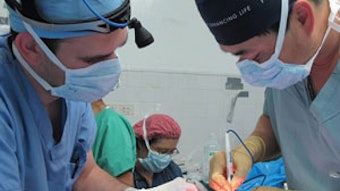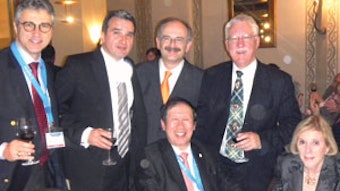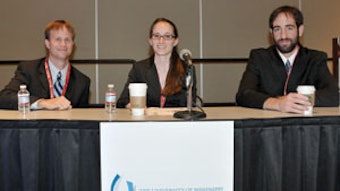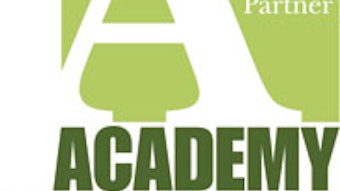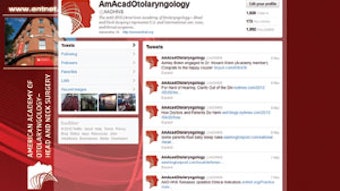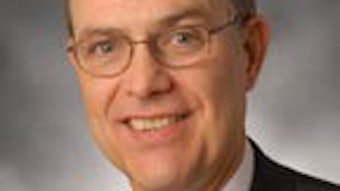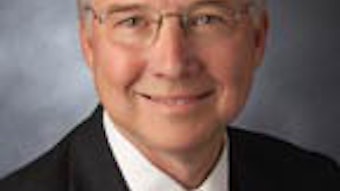PSQI Studies Risk to Provide Safe Care
The Patient Safety and Quality Improvement (PSQI) Committee continues to develop survey and database studies that identify zones of risk for otolaryngology–head and neck surgery and identify tools that can assist with providing safe care. This year, we had a particularly aggressive work plan with studies focusing on several areas within our specialty. In addition, the leadership team of PSQI represents AAO-HNSF at several national quality forums and therefore, ensures that otolaryngologist-head and neck surgeons have input to the national quality agenda. Descriptions of some of the studies either underway or completed during the past year are below: Post Admission Criteria for Obstructive Sleep Apnea Patients In collaboration with the Sleep Committee, this study examines whether it is safe to discharge patients with obstructive sleep apnea (OSA) from the hospital when they undergo what would otherwise be ambulatory surgery. Specifically, whether differences in key outcomes exist among patients with OSA undergoing ENT surgery based on location of surgery (inpatient vs. ambulatory outpatient). Current recommendations are that patients all be admitted to the hospital. This recommendation is based largely upon a few studies1,2 and expert opinion. A review of the experience of administrative data may exhibit enough variation or deviation from the recommendation to permit an assessment about the safety of such practices. Practitioner Handoffs Study The purpose of this project is to investigate current practices in patient care handoffs as related to the care of otolaryngology–head and neck surgery patients. Data is being collected regarding practices proposed within other disciplines, and current practices within both private and academic otolaryngology practices. The study, led by resident members of the committee, includes: Review of the literature regarding handoff practices within other healthcare disciplines; A survey study of residency program directors and current residents in training; and A survey study of private practice otolaryngology care providers. The goal is to compile information regarding current practices of provider handoffs in otolaryngology practices in the United States. Ultimately, the information attained could be useful in the development of best practice recommendations that otolaryngology providers may use to decrease potential inaccuracies in handoffs and improve the quality of care provided to patients. Trends in Otolaryngology–Head and Neck Surgery Closed Claims 2005-2011 and Risk Factors for Closed Claims in Endoscopic Sinus Surgery 2005-2009 Working with The Doctor’s Company, PSQI has engaged in two projects. We have analyzed and classified all closed claims for the last seven years, allowing us and The Doctor’s Company to identify important trends in closed claims. PSQI also completed a more detailed analysis of closed claims in endoscopic sinus surgery (ESS). By surveying The Doctor’s Company insured, we identified a control group of ESS cases that did not result in a claim, and used these control cases to do a formal case-control analysis of risk factors for adverse events in ESS. Both of these projects are in preparation for manuscript submission. Survey and Database Studies on Issues with Tonsillectomy The purpose of this study was to determine the variation in post-tonsillectomy admission practices and create a better understanding of the likelihood of apneic death on post op day one. Additionally, the study looked at delayed bleeding complications in tonsillectomy patients in order to improve the ability to make rational decisions about whom to admit and to provide criteria that can be used in discussions with payers when they disagree. A survey with close to 400 responses was finalized at the end of last year and a manuscript was completed earlier this year and has been submitted for publication. Survey and Database Studies on Issues with Tracheotomy In collaboration with the Airway and Swallowing Committee, three methodologies were used to obtain a realistic perspective on the incidence and potential opportunity for intervention in patients with tracheotomies: A National survey of surgeons regarding these events; A search of a national admissions database; and A search of a multi-institutional database developed by members of the Airway and Swallowing Committee. A series of manuscripts were published this past January in Laryngoscope. The articles represent a significant contribution to the peer-reviewed literature regarding outcomes of patients with tracheotomies with actionable items that have the potential to materially decrease adverse events and outcomes from tracheotomies. Creation of a Secure Database of ORL Adverse Events In addition to the survey and database studies, PSQI also is creating a secure web link that will enable members to submit de-identified patient safety data in a secure environment. This web link follows the Agency for Healthcare Research and Quality (AHRQ) guidelines and will provide the opportunity for PSQI to identify focus areas for future projects. Work with National Quality Organizations American Board of Internal Medicine Foundation Choosing Wisely Campaign The Academy joined with nine other medical societies for this campaign that has the goal of promoting wise choices by clinicians and patients in order to improve healthcare outcomes, provide patient-centered care that avoids unnecessary and even harmful interventions, and reduce the rapidly expanding costs of the healthcare system. Through the leadership of the PSQI Committee, we will be reaching out to specialty societies and other content producing committees to identify five tests or procedures commonly used in otolaryngology-head and neck surgery to be publicized in the fall as part of Choosing Wisely’s “Five Things Physicians and Patients Should Question” initiative. AMA Physician Consortium for Performance Improvement (PCPI) Summit on Overuse The PCPI and The Joint Commission are partnering on an initiative to look at areas of overuse. They have identified five areas for review, including tympanostomy tubes. David W. Roberson, MD, and Richard M. Rosenfeld, MD, are the Foundation representatives to this national summit, which is to take place in September in Washington, DC. Annual Meeting Programming Each year PSQI develops a miniprogram for the annual meeting focusing on important topics in patient safety and quality improvement. This year we will highlight the important work of the committee, and have some prominent speakers from the Academy, the ABOto, and an executive from a large health system provide the leadership view of patient safety and quality improvement. AAO-HNSF Annual Meeting & OTO EXPO in Washington, DC PSQI Miniprogram Injuries in Sinus Surgery (50 min.) Moderators: David W. Roberson, MD; Giri Venkatraman, MD; Subinoy Das, MD Leadership View of PSQI (50 min.) Moderators: Rahul K. Shah, MD; David R. Nielsen, MD; Robert H. Miller, MD; Kylanne Green Tonsillectomy Disasters (50 min.) Moderators: Michael J. Brenner, MD; Lee D. Eisenberg, MD; Reginald F. Baugh, MD Disasters in Facial Plastic Surgery (50 min.) Moderators: Matthew A. Kienstra, MD; Brian Nussenbaum, MD References Blake DW, et al. Preoperative assessment for obstructive sleep apnoea and the prediction of postoperative respiratory obstruction and hypoxaemia. Anaesth Intensive Care. 2008;36(3):379-384. Haeck PC, et al. ASPS Patient Safety Committee. Evidence-based patient safety advisory: liposuction. Plast Reconstr Surg. 2009 Oct;124(4 Suppl):28S-44S
The Patient Safety and Quality Improvement (PSQI) Committee continues to develop survey and database studies that identify zones of risk for otolaryngology–head and neck surgery and identify tools that can assist with providing safe care. This year, we had a particularly aggressive work plan with studies focusing on several areas within our specialty.
In addition, the leadership team of PSQI represents AAO-HNSF at several national quality forums and therefore, ensures that otolaryngologist-head and neck surgeons have input to the national quality agenda.
Descriptions of some of the studies either underway or completed during the past year are below:
Post Admission Criteria for Obstructive Sleep Apnea Patients
In collaboration with the Sleep Committee, this study examines whether it is safe to discharge patients with obstructive sleep apnea (OSA) from the hospital when they undergo what would otherwise be ambulatory surgery. Specifically, whether differences in key outcomes exist among patients with OSA undergoing ENT surgery based on location of surgery (inpatient vs. ambulatory outpatient). Current recommendations are that patients all be admitted to the hospital. This recommendation is based largely upon a few studies1,2 and expert opinion. A review of the experience of administrative data may exhibit enough variation or deviation from the recommendation to permit an assessment about the safety of such practices.
Practitioner Handoffs Study
The purpose of this project is to investigate current practices in patient care handoffs as related to the care of otolaryngology–head and neck surgery patients. Data is being collected regarding practices proposed within other disciplines, and current practices within both private and academic otolaryngology practices. The study, led by resident members of the committee, includes:
- Review of the literature regarding handoff practices within other healthcare disciplines;
- A survey study of residency program directors and current residents in training; and
- A survey study of private practice otolaryngology care providers.
The goal is to compile information regarding current practices of provider handoffs in otolaryngology practices in the United States. Ultimately, the information attained could be useful in the development of best practice recommendations that otolaryngology providers may use to decrease potential inaccuracies in handoffs and improve the quality of care provided to patients.
Trends in Otolaryngology–Head and Neck Surgery Closed Claims 2005-2011 and Risk Factors for Closed Claims in Endoscopic Sinus Surgery 2005-2009
Working with The Doctor’s Company, PSQI has engaged in two projects. We have analyzed and classified all closed claims for the last seven years, allowing us and The Doctor’s Company to identify important trends in closed claims.
PSQI also completed a more detailed analysis of closed claims in endoscopic sinus surgery (ESS). By surveying The Doctor’s Company insured, we identified a control group of ESS cases that did not result in a claim, and used these control cases to do a formal case-control analysis of risk factors for adverse events in ESS. Both of these projects are in preparation for manuscript submission.
Survey and Database Studies on Issues with Tonsillectomy
The purpose of this study was to determine the variation in post-tonsillectomy admission practices and create a better understanding of the likelihood of apneic death on post op day one. Additionally, the study looked at delayed bleeding complications in tonsillectomy patients in order to improve the ability to make rational decisions about whom to admit and to provide criteria that can be used in discussions with payers when they disagree. A survey with close to 400 responses was finalized at the end of last year and a manuscript was completed earlier this year and has been submitted for publication.
Survey and Database Studies on Issues with Tracheotomy
In collaboration with the Airway and Swallowing Committee, three methodologies were used to obtain a realistic perspective on the incidence and potential opportunity for intervention in patients with tracheotomies:
- A National survey of surgeons regarding these events;
- A search of a national admissions database; and
- A search of a multi-institutional database developed by members of the Airway and Swallowing Committee.
A series of manuscripts were published this past January in Laryngoscope. The articles represent a significant contribution to the peer-reviewed literature regarding outcomes of patients with tracheotomies with actionable items that have the potential to materially decrease adverse events and outcomes from tracheotomies.
Creation of a Secure Database of ORL Adverse Events
In addition to the survey and database studies, PSQI also is creating a secure web link that will enable members to submit de-identified patient safety data in a secure environment. This web link follows the Agency for Healthcare Research and Quality (AHRQ) guidelines and will provide the opportunity for PSQI to identify focus areas for future projects.
Work with National Quality Organizations
American Board of Internal Medicine Foundation Choosing Wisely Campaign
The Academy joined with nine other medical societies for this campaign that has the goal of promoting wise choices by clinicians and patients in order to improve healthcare outcomes, provide patient-centered care that avoids unnecessary and even harmful interventions, and reduce the rapidly expanding costs of the healthcare system. Through the leadership of the PSQI Committee, we will be reaching out to specialty societies and other content producing committees to identify five tests or procedures commonly used in otolaryngology-head and neck surgery to be publicized in the fall as part of Choosing Wisely’s “Five Things Physicians and Patients Should Question” initiative.
AMA Physician Consortium for Performance Improvement (PCPI) Summit on Overuse
The PCPI and The Joint Commission are partnering on an initiative to look at areas of overuse. They have identified five areas for review, including tympanostomy tubes. David W. Roberson, MD, and Richard M. Rosenfeld, MD, are the Foundation representatives to this national summit, which is to take place in September in Washington, DC.
Annual Meeting Programming
Each year PSQI develops a miniprogram for the annual meeting focusing on important topics in patient safety and quality improvement. This year we will highlight the important work of the committee, and have some prominent speakers from the Academy, the ABOto, and an executive from a large health system provide the leadership view of patient safety and quality improvement.
AAO-HNSF Annual Meeting & OTO EXPO in Washington, DC
PSQI Miniprogram
- Injuries in Sinus Surgery (50 min.) Moderators: David W. Roberson, MD; Giri Venkatraman, MD; Subinoy Das, MD
- Leadership View of PSQI (50 min.) Moderators: Rahul K. Shah, MD; David R. Nielsen, MD; Robert H. Miller, MD; Kylanne Green
- Tonsillectomy Disasters (50 min.) Moderators: Michael J. Brenner, MD; Lee D. Eisenberg, MD; Reginald F. Baugh, MD
- Disasters in Facial Plastic Surgery (50 min.) Moderators: Matthew A. Kienstra, MD; Brian Nussenbaum, MD
References
- Blake DW, et al. Preoperative assessment for obstructive sleep apnoea and the prediction of postoperative respiratory obstruction and hypoxaemia. Anaesth Intensive Care. 2008;36(3):379-384.
- Haeck PC, et al. ASPS Patient Safety Committee. Evidence-based patient safety advisory: liposuction. Plast Reconstr Surg. 2009 Oct;124(4 Suppl):28S-44S
